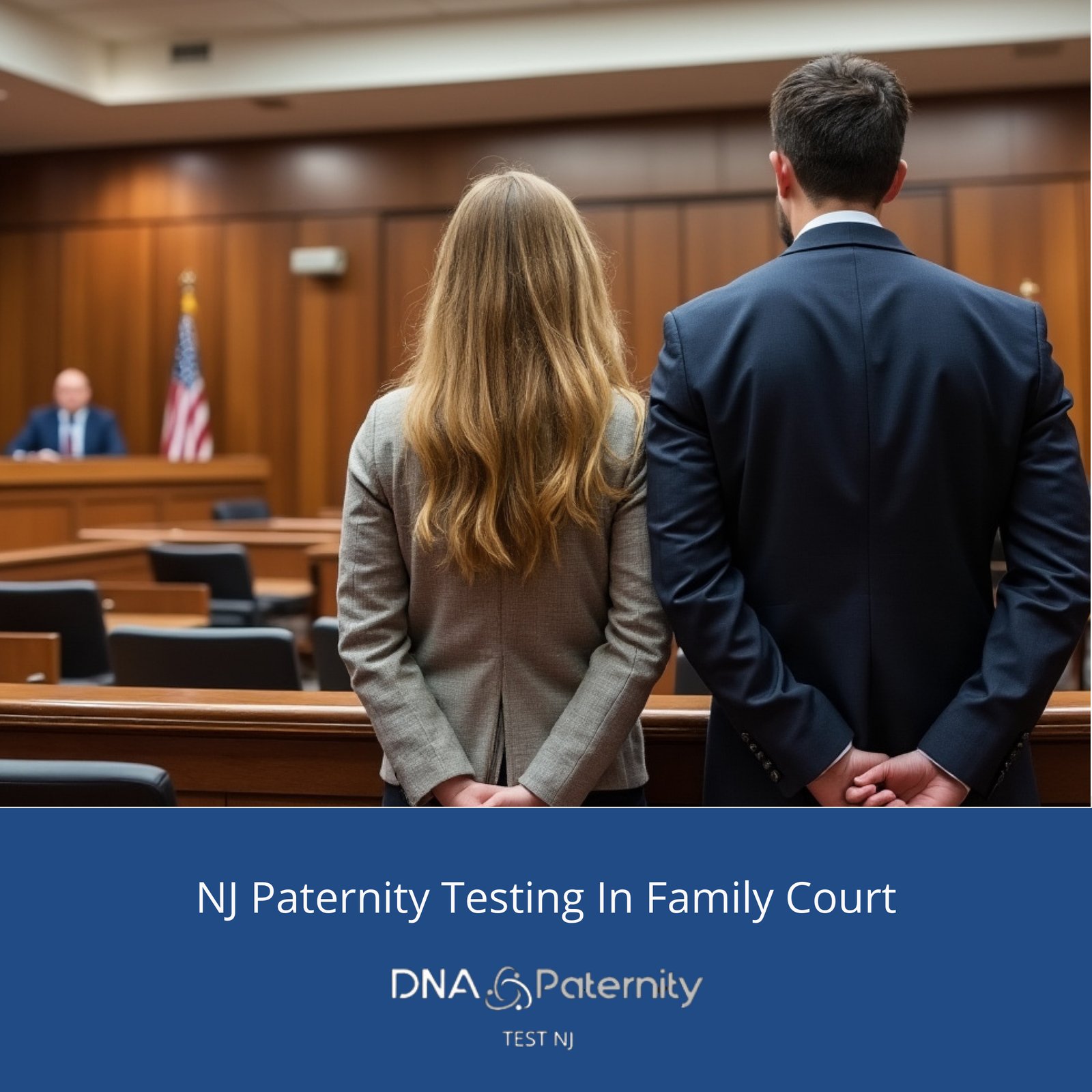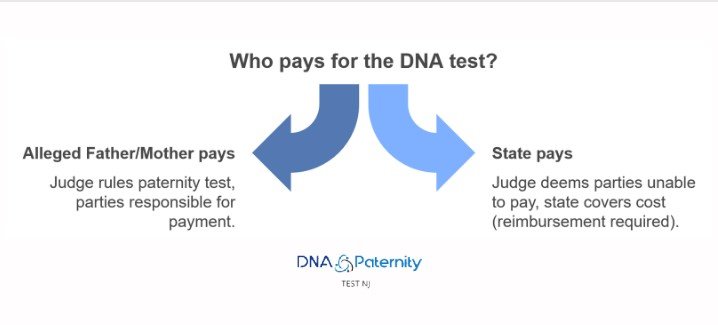
How to get a paternity test through NJ Family Court?
In order to perform a court-ordered paternity test through the courts, a petition or allegation must be claimed through New Jersey Family Court. Once the claim has been made the process to establish the paternity of the child will begin in roughly 3 months or 90 days to locate the father. This is assuming the alleged father did not file the claim himself.

Who pays for a DNA test in court?
Over the years, we have seen two scenarios play out in court in regard to who pays for a DNA test.
1. If the alleged father or mother is financially able to pay for their own DNA test the judge will rule a paternity test be performed and the parties involved normally an alleged father will be responsible to pay for the DNA test.
Performing a DNA test privately or out of pocket has a much quicker turnaround time. If you-you would like to perform a Court-Admissible Legal Paternity Test in New Jersey please contact our office today at 973-609-5102 for an appointment.
2. If the judge deems the parties involved are unable to pay for the DNA test themselves. Then the judge may decide to allow the state to pay for the DNA test. Please note, It is our understanding that when the state pays for a DNA test this is not free. The party/s involved will be responsible for reimbursing the state.
Performing a DNA test through the state has a longer turnaround time of 6-8 weeks. Often times DNA tests run through the courts do not test on as many markers as private DNA testing labs. This is important to note if time is important and you need to determine who the biological father is, you may need to use a private DNA parentage lab.
If you prefer performing a legal Court-Ordered DNA Test privately in New Jersey instead of DNA testing through the NJ Family Court. Please contact our office today at 973-609-5102 for appointments.
Please note, your paternity test results are recognized by the New Jersey Family Courts listed below.
- Atlantic County Family Court
- Bergen County Family Court
- Burlington County Family Court
- Camden County Family Court
- Cape May County Family Court
- Cumberland County Family Court
- Essex County Family Court
- Gloucester County Family Court
- Hudson County Family Court
- Hunterdon County Family Court
- Mercer County Family Court
- Middlesex County Family Court
- Monmouth County Family Court
- Morris County Family Court
- Ocean County Family Court
- Passaic County Family Court
- Salem County Family Court
- Somerset County Family Court
- Sussex County Family Court
- Union County Family Court
- Warren County Family Court
How is paternity established in New Jersey?
When it comes to establishing who the father is in the state of New Jersey. There are several ways this can be executed.
1. An alleged father can sign a Voluntary Acknowledgement of Paternity (VAP) at the hospital or, The VAP can be signed at the local registrar’s office in your city in New Jersey.
2. File petition to establish paternity with Family Court. This can be done by the mother, a custodial parent other than the mother, or, a man who believes he is the biological father of a child.
3. If a child is born during a marriage the husband is automatically assumed to be the biological father of the child by the state.
Top Reason DNA Test May Be Used In Family Court:
1. Child Support
2. Child Custody
3. Adoption
4. Paternity Establishment
How can I request a DNA test for child support?
In order to request a DNA test for the purposes of child support. The alleged father must file a petition with the Family Court in his city. If a judge agrees with the premise of your petition. The judge will issue a court order to the mother of her child. If the mother ignores the court order. She will be held in contempt of court.
The process described for the alleged father also works the same for a mother who has a difficult time with an alleged father who refuses to partake in a paternity test without the court’s involvement. It is important to note, the process described above pertains to unmarried parents. If you are married the husband is automatically considered the legal father of any child born within his marriage.
If a husband believes he is not the biological father of a child born within his marriage. The husband can perform a paternity test between a father and child without the mother’s consent. It is recommended that the mother is involved with the paternity testing process but, We are aware some circumstances will not allow this to happen. If you would like to learn more about our paternity testing visit our paternity testing page here.
How to get a court-ordered paternity test without a lawyer?
Performing a legal paternity test does require a Lawyer if you or do not have a court order from a judge.
A lawyer is not required for an alleged father or the mother of a child who wants to establish the paternity of the child when the other party does not agree to genetic testing.
If you do not have a lawyer, you can petition the court yourself by filing the necessary paperwork. Depending on the state, you may need to submit a petition, affidavit, or other documents to the court in order to request a paternity test. You should check with your local court to find out what documents are needed for filing a paternity petition.
After you file the petition within Family Court and your petition has been accepted. Family Court will issue a court order to the Respondent.
To file a paternity petition in New Jersey, you will need to file a petition with the Family Court near your city.
Contact your local courts. It should also be noted that when performing a DNA test to establish paternity both parents must participate in the testing process.
Does New Jersey have paternity laws?
The NJ Parentage Act is a set of statutes that incorporates paternity DNA testing as a scientific tool to help determine if a man is biologically related to a child for the purposes of establishing paternity.
Moreover, aside from the provisions outlined in the Parentage Act, New Jersey does not have specific laws governing paternity testing.
Understanding paternity laws is crucial for establishing parental rights, responsibilities, and benefits, including child support, custody, and access to family medical history. The NJ Parentage Act plays a pivotal role in this process, providing a legal framework for paternity determination.
